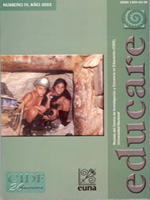El trabajo infantil y sus repercusiones en el desarrollo integral de las personas menores de edad
DOI:
https://doi.org/10.15359/ree.2003-4.3Abstract
This article considers the impact of child labour (Child work exploitation) in the adequate integral development of boys, girls and teenagers, specifically on aspects related to their physical, emotional, social, moral and cognitive growth. This type of activity shows serious consequences when youngsters abandon the educational system to dedicate their time to work.
This peper points out child labour as one of the main causes of explotation and chil abuse in this population group, and questions our role, as citizens, towards the management of this situation.
References
Carrillo, M. de los A. y Bomilla, V. H. (2002). Cartago: Dimensión, naturaleza y entorno socioeconómico del trabajo infantil y adolescente. Costa Rica: Programa Internacional para la Erradicación del Trabajo Infantil; Organización Internacional del Trabajo.
Dobles T., C. y Antezana R., P. (2002). El trabajo infantil y adolescente
doméstico en Costa Rica. Costa Rica: Oficina Internacional del trabajo; Programa Internacional para la Erradicación del Trabajo Infantil.
Fondo de las Naciones Unidas para la Infancia. (1997). Educación y trabajo infanta-juvenil. Informe. Costa Rica: UNICEF.
Fondo de las Naciones Unidas para la Infancia. ( 1997). Estado Mundial de la Infancia 1997. Estados Unidos de América: UNICEF.
Ministerio de Educación Pública. (2003). Estadísticas. Costa Rica: Departamento de Estadística.
Municipalidad de San José. (1999). Perfil del trabajo infanto juvenil en
espacios públicos del Cantón Central de San José. Costa Rica: UNICEF.
Naciones Unidas. (1989). Convención sobre los Derechos del Niño. Asamblea General de las Naciones Unidas.
Organización Internacional del Trabajo. (1996). El trabajo infantil: ¿ Qué hacer? Ginebra: Oficina Internacional del trabajo; Programa Internacional para la Erradicación del Trabajo Infantil.
Organización Internacional del Trabajo. (s.f.). Trabajo infantil, Derechos de los niños y Educación. Libro 1. Oficina Internacional del trabajo: Programa Internacional para la Erradicación del Trabajo Infantil.
Patronato Nacional de la Infancia. (1999). Principales disposiciones legales sobre niñez y adolescencia en Costa Rica. Ley Nº 7739. Costa Rica: Patronato Nacional de la Infancia.
Trejos Z., Y. (1998). Programa para favorecer el desarrollo personal de
los niños y niñas con necesidades educativas especiales, mediante el fortalecimiento
de su autoestima. Costa Rica: Universidad Nacional.
Published
How to Cite
Issue
Section
License
1. In case the submitted paper is accepted for publication, the author(s) FREELY, COSTLESS, EXCLUSIVELY AND FOR AN INDEFINITE TERM transfer copyrights and patrimonial rights to Universidad Nacional (UNA, Costa Rica). For more details check the Originality Statement and Copyright Transfer Agreement
2. REUTILIZATION RIGHTS: UNA authorizes authors to use, for any purpose (among them selfarchiving or autoarchiving) and to publish in the Internet in any electronic site, the paper´'s final version, both approved and published (post print), as long as it is done with a non commercial purpose, does not generate derivates without previous consentment and recognizes both publisher's name and authorship.
3. The submission and possible publication of the paper in the Educare Electronic Journal is ruled by the Journal’s editorial policies, the institutional rules of Universidad Nacional and the laws of the Republic of Costa Rica. Additionally, any possible difference of opinion or future dispute shall be settled in accordance with the mechanisms of Alternative Dispute Resolution and the Costa Rican Jurisdiction.
4. In all cases, it is understood that the opinions issued are those of the authors and do not necessarily reflect the position and opinion of Educare, CIDE or Universidad Nacional, Costa Rica. It is also understood that, in the exercise of academic freedom, the authors have carried out a rogorous scientific-academic process of research, reflection and argumentation thar lays within the thematic scope of interest of the Journal.
5. The papers published by Educare Electronic Journal use a Creative Commons License:















 The articles published by Educare Electronic Journal can be shared with a Creative Commons License:
The articles published by Educare Electronic Journal can be shared with a Creative Commons License: 



